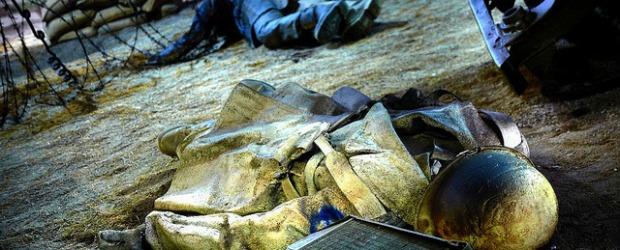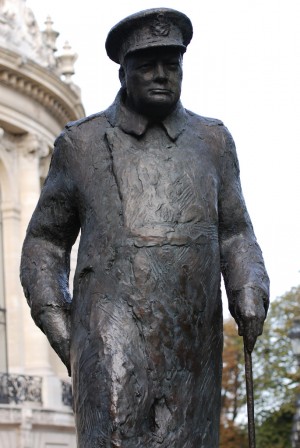You have no items in your cart. Want to get some nice things?
Go shopping
‘Then every soldier kill his prisoners!
We’ll cut the throats of those we have,
And not a man of them that we shall take
Shall taste our mercy.’
A Head of State requesting legal sanction to invade a foreign country, a dodgy dossier, a pre-emptive strike, war crimes, the torture of prisoners, rape as a weapon of war, the eroticism of military violence, soldiers questioning the morality of the conflict – and one very accomplished spin doctor.
Do the war leaders and reporters who carelessly reference Shakespeare’s Henry V to whip up patriotic fervour or justify military expansionism ever read the play?
Shakespeare’s scrupulous interrogation of the politics and ethics of war presents a charismatic skilled political performer, a conjuror of illusion able to offer his people the myth of national unity and the glory of territorial conquest, and at the same time shows us how it’s all done. How do you get the legal and moral right to invade a sovereign country? How do you get exhausted, starving soldiers facing certain imminent defeat psyched up to fight an enemy that massively outnumbers them? How do your spin doctors, with a war to sell and a media to control, ensure the message gets across?
And most chillingly resonant throughout the four centuries since it was written is the question the play is most concerned to dramatise: ‘Can there be such a thing as a ‘just’ war?
The plot kicks off with a dodgy dossier in a scene that delivers a brilliant comic satire on political deal-brokering and the ease with which rulers can fabricate reasons for a pre-emptive strike. Parliament’s threatening to take away the clergy’s property and assets and give them to the poor and the bishops are desperate to find a way to stop it. The deal is that they’ll provide legal justification for Henry to invade France if the King will take the clergy’s side against Parliament. The dossier takes centre stage to expose the political opportunism behind Henry’s military expansionism as the Archbishop, the highest religious cleric in the land and ostensible keeper of the nation’s moral conscience, fumbles through a mountain of documents to produce Henry’s highly dubious legal claim to the French throne.
When Donald Rumsfeld was asked by a journalist why he was so sure that there were weapons of mass destruction in Iraq, he said: ‘We have the receipts’. Shakespeare would have loved that. And more hilariously (and disturbingly), this insight from Andrew Carr, the White House Chief of Staff, on why the Bush administration waited until after Labor Day to try to sell the American people on war against Iraq: ‘From a marketing point of view, you don’t roll out new products in August.‘ And Paul Wolfowitz, Deputy Defense Secretary, let the cat out of the bag when he admitted: ‘The truth is that for reasons that have a lot to do with the U.S. government bureaucracy we settled on the one issue that everyone could agree on which was weapons of mass destruction as the core reason…’
A document of dubiously reliable intelligence became, of course, the source of Tony Blair’s notorious claim to the House of Commons that Iraq had weapons of mass destruction which could be deployed within 45 minutes, when, according to Major General Michael Laurie, the head of the Defence Intelligence Staff at the time of the dossier, ‘we could find no evidence of planes, missiles or equipment that related to weapons of mass destruction’. According to an MI6 officer working on the dossier, ‘the 45-minute claim was based in part on wishful thinking.’
What Shakespeare might have made of Blair’s repeated justification for taking the country to war – a personal belief that it was ‘the right thing’ to do – gives pause for thought. The defence for his actions which Blair gave years later in his memoir is telling: ‘Politicians are obliged from time to time to conceal the full truth, to bend it and even distort it, where the interests of the bigger strategic goal demand that it be done’.

Churchill famously borrowed many of the powerful rhetorical devices of the most celebrated and magnificent call to arms on record -Henry’s St Crispin’s Day speech before the battle of Agincourt: ‘From this day to the ending of the world,/ But we in it shall be remember’d;/ We few, we happy few, we band of brothers…’ which is echoed in Churchill’s historic peroration: ‘If the British Empire and its Commonwealth last for a thousand years, men will still say, “This was their finest hour.” Never in the field of human conflict was so much owed by so many to so few.’
Even in Henry’s rallying oration, Shakespeare undercuts the glorifying of war by reminding his audience that not all these men will survive: Only ‘He that outlives this day, and comes safe home… He that shall live this day, and see old age’ will be able to look back with pride as an Agincourt veteran in the years to come. The rather more prosaic words of the consultant to the United States Department of Defense, Michael Leeden, expressed the same sentiment urging war on Iraq: ‘Just wage a total war against these tyrants; I think we will do very well and our children will sing great songs about us years from now.’
Henry also wants war with France because he’s worried that if he’s away conquering France, England will be invaded by the Scots. In 1599 when Henry V was written Elizabeth I was mobilising a major campaign against Ireland, led by her volatile young favourite, the Earl of Essex. The fifth act Chorus, after exhorting the audience to imagine the ecstatic welcoming home of Henry and his army, makes an overt allusion to Essex; how ‘London doth pour out her citizens… fetching their conquering Caesar in.’ Even here, the vision of national unity is subverted by showing the English, Welsh and Irish soldiers squabbling. Shakespeare gives the Irish soldier MacMorris a voice, questioning England’s right to speak for Ireland at the very time when the real Essex is spiking the real Irish on his sword in order to conquer the country for Elizabeth.
At the time of the first Iraq war in 1991 Anthony Lewis, a columnist for the New York Times quoted the roll call of the English dead from Henry V. He left out the listing of the French dead, which, like so much else in the play, has an ambiguous effect on the audience. The speech reinforces the disparity of numbers between the armies, highlighting the victory against all odds, but it also gives a disquieting sense of loss of life on the French side. If the speech is presented as a gloating expression of triumphant conquest it removes the ambivalence Shakespeare brings to the moment. There is no sense of this ambiguity in Lewis’ article which likens Shakespeare’s roll call to the figures for the US and Iraqi casualties with a triumphalism that is not found in the play: ‘Victory in the war with Iraq leaves us with such feelings of awe… The casualties are as disproportionate as they were at Agincourt.’
(General Tommy Franks, Commander of the United States Central Command and the man in charge of the US-led invasion of Iraq was against making such lists: ‘We don’t do body counts.’)
Shakespeare places a spin doctor in the figure of the Chorus at the beginning of each act to give the official versions of events, which is then followed by actions – what really happened – that completely contradict the hype. The ‘press release’, in a speech unparalleled by its magical evocation of mood on the eve of battle, describes the King touring the English camp where every soldier ‘pining and pale before/ Beholding him, plucks comfort from his looks.’
As dawn approaches and the battle is about to begin, the Chorus’s romanticised vision of ideal kingship and soldiers’ unquestioning loyalty is revealed to be a tissue of fabrications, and the politically contrived justification for war comes tumbling down. For the play’s original audience, the Battle of Agincourt in 1415 would still have figured in the national consciousness with great pride as a resounding English triumph against the French. This is the moment when the audience would have been anticipating speeches of patriotic zeal on the part of the soldiers. Instead, Shakespeare chooses an ordinary foot soldier to offer an unanswerable intellectual challenge to the King’s motive for war. When Henry, in disguise, says his cause is ‘just’ and the war ‘honourable’ Michael Williams, the soldier, replies: ‘That’s more than we know.’ If the cause of the war is ‘not just’, he says, it will be the King who’s responsible when ‘all those legs and arms and heads are chopped off in battle, some crying for a surgeon, some upon their wives left poor behind them… some upon their children rawly left. I am afeard there are few die well that die in a battle; for how can they charitably dispose of any thing, when blood is their argument? Now, if these men do not die well, it will be a black matter for the king that led them to it’
The speech is the moral heart of the play and what is most remarkable is that it calls up and rewrites Henry’s war-mongering rhetoric. The focus now is not on those who will ‘outliive this day’ but who will never ‘come home safe’ and ‘see old age’. Instead of the veteran who will ‘strip his sleeve and show his scars. And say ‘/These wounds I had on Crispin’s day’, the slaughtered men ‘will cry: We died at such a place;’
The most striking example of Shakespeare’s concern to show the darker side of Henry’s character and the savagery of militarism is that he completely overturned the order of events surrounding Henry’s order to kill his prisoners.
‘We’ll cut the throats of those we have,/ And not a man of them that we shall take/ Shall taste our mercy’. In the history chronicles which Shakespeare used as source material it is only when the French provoke Henry that he gives the order to kill all his prisoners. Shakespeare – astonishingly – dares to make Henry give the order before he hears of the French raid. The stage direction opening the scene is significant: many of these prisoners are on stage. The audience is being made to watch the French soldiers hearing their death sentence. Henry’s brutality has already been underscored earlier in the play with his obscene speech at the siege of Harfleur, where he threatens to let loose his sexually fired-up soldiers rape all the town’s virgins. Shakespeare’s many depictions of the horrors of military conflict show particular revulsion for the tradition of raping women on the losing side. The speech forms a terrifyingly graphic image of rape as a weapon of war, with a pornographic subtext denoting the rapists’ ‘hands’ [cocks] piercing the ‘locks’ [the hymens], of the fresh-faced virgins with ‘hot and forcing violation’.
Commentators have tended to explain away the Shakespearean and historical Henry’s savagery by insisting that such actions were consistent with the laws of war at the time, but by fifteenth and sixteenth century standards to massacre unarmed noblemen went against all international laws of chivalry.
The chronicler was appalled at the extent of the atrocity:
Pity it was to see and loathsome it was to behold how some Frenchmen were suddenly sticked with daggers, some were brained with poleaxes… others had their throats cut… few prisoners or none were saved.
The chronicler describes how six hundred French horsemen robbed Henry’s camp and ‘slew such servants as they found to make any resistance’, and when the English King hears this ‘he contrary to his accustomed gentleness, commanded… that every man (upon pain of death) should incontinently slay his prisoner. When this lamentable slaughter was ended…’
In his 1944 film Laurence Olivier deleted the order and showed what is only reported in the play – the French killing of the English boys in the camp. Olivier’s omissions and deletions were made to serve the film’s declared purpose of bolstering the country’s morale during the Second World War.
Kenneth Branagh, in his 1989 film, went further. He cut the order to kill the prisoners, and not only showed the French slaughtering the English boys, but dwelt at length on the savagery of the killings – shot after shot of the bloodied faces and bodies of the English laying on the mud. To the intrusive sentimentalising music, we see a very slow funeral procession, the central focus is Henry carrying one of the dead children in his arms, the focus on the King seen as a compassionate, sensitive figure at the moment which, in Shakespeare’s play, shows him capable of callous brutality. His screenplay reads, Henry ‘gently’ lays the Boy down, kisses him, again ‘gently’ on the head. ‘We cut close on his blood-stained and exhausted face, the dreadful price they have all had to pay for this so-called victory etched into his whole being. His head drops as if in shame.’
In both films, then, the English slaughter of the French has simply disappeared. When promoting his film, Branagh described Olivier’s film as ‘obsolete’, and was ‘convinced’ he could make ‘a truly popular film’, listing the ’ingredients’ that would be needed to persuade [the producer’s] financial contacts to invest in the film.’
Along with the film’s vanishing of the English butchery of the French, there is also the removal of Shakespeare’s customary trust in the sensitivity and intelligence of his audience to make refined judgements of his characters’ actions. Branagh’s lingering shots of the children’s dead bodies being carried across the field of carnage indulges in something Shakespeare is always careful to avoid: sentimentalising. In cinematic terms, the whole scene is shot in such a way as to make it a principal moral theme of the film. It acts as a powerful endorsement of Henry’s moral right to his victory and of his nation’s entitlement to the conquest of a sovereign country, when the play suggests that the actions of the conqueror could be seen as war crimes.
More subversive still is how Shakespeare closes the play. The spin doctor is finally forced to tell the truth. The Chorus comes on stage with an Epilogue that can no longer be allowed to be a cover-up. He tells the audience that the aftermath of conquest was loss of France and bitter civil war which made ‘England bleed’. Shakespeare’s final word on the conflict leaves the audience confronting the unpalatable reality that though the war was a resounding victory for the invading forces, it turned out to be little other than an exercise in futility.


About Pauline Kiernan
Pauline is a Shakespeare scholar, literary critic, awarded-winning playwright and screenwriter. She’s held lectureships and fellowships at Oxford and Reading Universities, is the author of Shakespeare’s Theory of Drama, Staging Shakespeare at the New Globe and Screenwriting They Can’t Resist. She gives talks on Shakespeare and creative writing in the UK and US. She’s currently working on a major project about Shakespeare and a novel. Her best-selling Filthy Shakespeare, an Observer Book of the Year, is recently republished in an e-book edition.

